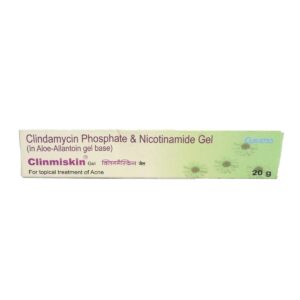NICOTINAMIDE + CLINDAMYCIN + ALLANTOIN
Nicotinamide: Nicotinamide, also known as niacinamide, is a form of vitamin B3 that is used as a supplement or medication. It is primarily used in the treatment and prevention of niacin deficiency, which can lead to a condition called pellagra. Nicotinamide is also used for various other purposes, including the treatment of acne and certain skin conditions.
The mechanism of action of nicotinamide is not fully understood, but it is believed to work through multiple biochemical pathways. It functions as a precursor to nicotinamide adenine dinucleotide (NAD+) and nicotinamide adenine dinucleotide phosphate (NADP+), which are essential coenzymes involved in various cellular processes. By increasing the levels of NAD+ and NADP+, nicotinamide supports numerous enzymatic reactions, including those responsible for energy metabolism and DNA repair.
The recommended dose of nicotinamide depends on the specific condition being treated. For niacin deficiency, the typical adult dose is 500-1000 mg per day, divided into multiple doses. For acne treatment, lower doses ranging from 250-500 mg are usually sufficient. It is important to follow the dosing instructions provided by a healthcare professional.
Nicotinamide is generally well tolerated and has a low risk of side effects. Common side effects may include stomach upset, nausea, diarrhea, and a flushed or tingling sensation in the skin. These side effects are usually mild and transient. In rare cases, high doses of nicotinamide may cause liver toxicity, and individuals with liver disorders should exercise caution when using this medication.
It is important to note that while nicotinamide is generally safe, higher doses should only be used under medical supervision. Additionally, it is always advisable to consult a healthcare professional before starting any new medication or supplement to ensure it is safe and appropriate for individual circumstances.
Clindamycin: Clindamycin is an antibiotic medication used to treat various bacterial infections. It belongs to the class of drugs known as lincosamides. Clindamycin is commonly prescribed for skin and soft tissue infections, respiratory tract infections, bone and joint infections, intra-abdominal infections, and certain types of bacterial vaginosis.
The main mechanism of action of Clindamycin is the inhibition of bacterial protein synthesis. It works by binding to the 50S subunit of the bacterial ribosome, which prevents the addition of new amino acids to the growing peptide chain. This inhibits bacterial growth and ultimately leads to bacterial cell death.
The dose of Clindamycin may vary depending on the severity of the infection, patient age, and other factors. It is available in various formulations, including oral capsules, oral solution, and injectable form. The typical adult dose for most infections ranges from 150 mg to 450 mg every 6 to 8 hours. For severe infections, the dosage may be increased to 600 mg every 6 hours.
Common side effects of Clindamycin include nausea, diarrhea, stomach pain, vomiting, and skin rashes. Diarrhea is a particularly common side effect, and it can sometimes be severe or even life-threatening. This could be a sign of a serious condition called Clostridium difficile-associated diarrhea (CDAD), which may occur due to the disruption of normal gut flora.
In rare cases, Clindamycin can cause more serious side effects such as severe allergic reactions, liver problems, and a rare condition called pseudomembranous colitis. It is important to report any severe or persistent side effects to a healthcare professional.
It is worth noting that Clindamycin may interact with other medications, so it is essential to inform the prescribing doctor about any other medications or supplements being taken. Additionally, Clindamycin should only be used as directed by a healthcare professional and the full course of treatment should be completed, even if symptoms improve before the prescribed duration.
Allantoin: Allantoin is a natural substance that is commonly used in skincare products due to its soothing and healing properties. It is derived from the comfrey plant and can be found in creams, lotions, and ointments.
Allantoin works by promoting cell regeneration and stimulating the growth of new tissue. It helps to accelerate wound healing, reduce inflammation, and moisturize the skin. Additionally, it acts as a keratolytic agent, which means it helps to exfoliate the skin and remove dead cells, leaving behind smoother and softer skin.
The recommended dose and application of allantoin vary depending on the specific product and its concentration. Generally, it is applied topically to the affected area of the skin. It is important to follow the instructions provided by the product manufacturer or consult a healthcare professional for accurate dosage information.
Allantoin is generally considered safe when applied topically. It is well-tolerated by most individuals and rarely causes side effects. However, in some cases, allergic reactions such as skin irritation, redness, or itching may occur. If any undesirable effects are experienced, it is recommended to discontinue its use and seek medical advice.
Overall, allantoin is a widely used skincare ingredient that provides numerous benefits including wound healing, moisturization, and gentle exfoliation. However, it is always advisable to perform a skin patch test before using any new product containing allantoin or consult a dermatologist for personalized recommendations.

